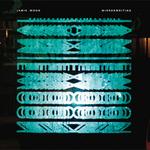
Jamie Woon Mirrorwriting
(Polydor)
It’s a strange thought to consider what music is, what music really is. As I write pulses of electricity are causing repeating sequences motorised into patterns in the vibration of panels in my speakers, in turn buffering the air back and forth, causing the molecules to oscillate in waves, transferring the sound on a macroscopic level into my ear and onto its drum; from there sensory neurones take all these millions of subtle changes in pressure and reorganize and manipulate them with such dexterity as to isolate and recognize every trembling bassline, every distinct drum line, every change of pitch in every piano tinkle. And then there’s how those notes conjured up in the Temporal lobe interact and influence our conscious brain – how they flood our synapses and invoke mood and meaning in our Frontal lobes. Now that may be a huge, arcing simplification, but that doesn’t make it any less intriguing. And, as Mirrorwriting sinks through that chain of physical and biological happenings into your ear and out the other side, it doesn’t half make you think of just how impressive your average album can be.
That’s not to say that this, the debut of the hotly tipped Jamie Woon, is average. It is all it was expected to be: a purring, smooth and highly polished amalgamation of pop, singer-songwriter and ambient electronica. All that makes for a lovely record and indeed one that is positively hard to criticise.
Mirrorwriting feels every inch like it has been designed to be beautiful, utilising modern production and silky soul in tandem. Through the entire record the arrangements of the two continuously threaten something spectacular: there’s the insatiable hip hop undercurrent of Lady Luck; the honest cool of Shoulda; the measured, meandering movement in Spirits or the endearing TMRW as it asks “How do we get through [to] tomorrow every day?”
The whole thing is excellent, it really is, but moment to moment there’s an inescapable absence of that flash of brilliance that this record so oft promises but ultimately never delivers. As the album marches onwards the sense is that this may have already come and gone: the opener Night Air and easy minimalism of Gravity are as good as Woon will get on the record, but while that’s only ever a touch off the sublime, it’s never quite as breathtaking or as flawless as you might have hoped.
With its at times blissfully understated cool Mirrorwriting confirms Woon as a man capable of a making truly remarkable music, the sort of music that makes it clear what a miraculous triviality it is to turn on a record and let it spin. Moreover, it marks him out as capable of one day delivering a truly outstanding album too: unfortunately, this is not it.
25 May, 2011 - 22:08 — Joe Iliff